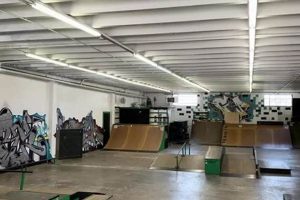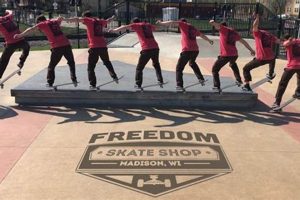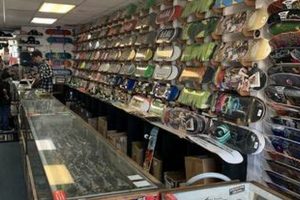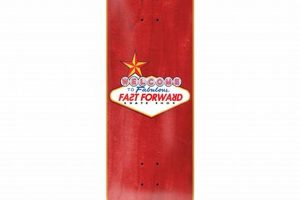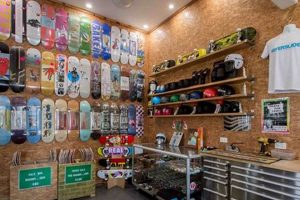The establishment serves as a retail outlet specializing in skateboarding equipment and apparel. It also functions as a central location and dedicated space for a sponsored skateboarding team. This dual role merges commercial activity with the support and promotion of skateboarding talent.
Such an arrangement offers advantages to both the business and the team. The shop gains visibility and credibility through its association with the team, potentially increasing sales and brand recognition. The team benefits from sponsorship, receiving support for equipment, travel, and other expenses, allowing its members to focus on skill development and performance. Historically, these symbiotic relationships have proven effective in fostering growth within the skateboarding community.
The following sections will delve into specific aspects of the business model, its impact on the local skateboarding scene, and the team’s accomplishments and contributions to the sport.
Skateboarding Enhancement Strategies
The following strategies, informed by expertise within the skateboarding community, are presented to aid in skill development and equipment maintenance.
Tip 1: Equipment Assessment: Regularly inspect all components, including the deck, trucks, wheels, and bearings, for signs of wear or damage. Address any issues promptly to ensure safety and optimal performance. For example, worn bearings can significantly reduce speed and control.
Tip 2: Consistent Practice: Dedicate time to consistent practice, focusing on fundamental skills before progressing to more complex maneuvers. Repetition builds muscle memory and improves overall board control. Practice sessions should be structured with clear objectives.
Tip 3: Terrain Variation: Seek opportunities to skate on varied terrain, including flat ground, ramps, rails, and bowls. This exposure expands skill sets and adaptability. Each terrain type presents unique challenges and opportunities for learning.
Tip 4: Protective Gear Utilization: Always wear appropriate protective gear, including a helmet, knee pads, elbow pads, and wrist guards. Prioritize safety to prevent injuries and prolong participation in the sport. Consistent use of gear minimizes risk during falls.
Tip 5: Community Engagement: Engage with the local skateboarding community through skate sessions, events, and workshops. Collaboration and knowledge sharing can accelerate skill development and foster a supportive environment. Learning from experienced skaters is invaluable.
Tip 6: Trick Progression: Approach trick learning in a systematic manner, breaking down complex tricks into smaller, manageable steps. Mastering each step individually facilitates the overall learning process. Start with simpler variations before attempting more advanced combinations.
Tip 7: Filming and Analysis: Record skateboarding sessions and analyze the footage to identify areas for improvement. This visual feedback loop allows for objective self-assessment and targeted practice. Focus on body positioning, timing, and board control.
These strategies emphasize the importance of proper equipment maintenance, consistent practice, and community involvement in achieving skateboarding goals. Adherence to these guidelines can contribute to a safer and more fulfilling skateboarding experience.
The subsequent section will explore the cultural impact of skateboarding and its evolution as a recognized sport and art form.
1. Retail Operations
Retail operations are fundamental to the function and sustainability of the “edge skate shop & home of team edge.” They provide the primary revenue stream necessary to support both the business and the sponsored skateboarding team. The effectiveness of these operations directly impacts the shop’s ability to invest in the team and maintain its presence within the skateboarding community.
- Inventory Management
Effective inventory management is crucial for optimizing profitability and meeting customer demand. This involves carefully selecting products that align with current trends and customer preferences, as well as maintaining adequate stock levels to avoid shortages or overstocking. For example, tracking sales data to identify popular items and adjusting orders accordingly can minimize losses from unsold merchandise and maximize revenue generation. In the context of the shop, successful inventory management translates to consistent availability of high-quality skateboarding equipment for both the team and the broader customer base.
- Customer Service
Providing exceptional customer service fosters loyalty and positive word-of-mouth referrals. This includes offering knowledgeable advice, addressing customer inquiries promptly, and resolving issues efficiently. For example, training staff to understand the technical aspects of skateboarding equipment allows them to assist customers in selecting the most appropriate products for their needs and skill level. Within the shop’s ecosystem, positive customer experiences contribute to increased sales, which in turn supports the team’s activities and the shop’s overall growth.
- Point of Sale (POS) Systems
Implementing a robust POS system streamlines transactions, tracks sales data, and manages inventory efficiently. A well-designed POS system can provide valuable insights into customer purchasing patterns, identify popular products, and generate reports that inform inventory management decisions. For example, a POS system can track sales by product category, enabling the shop to identify trends and adjust its inventory accordingly. The efficient operation facilitated by a strong POS is essential for maximizing profitability and ensuring the financial health of the business.
- Marketing and Promotion
Strategic marketing and promotion are essential for attracting new customers and retaining existing ones. This includes utilizing a variety of channels, such as social media, email marketing, and local advertising, to reach target audiences and promote products and services. For example, sponsoring local skateboarding events or partnering with other businesses in the community can increase brand awareness and drive traffic to the shop. In the context of “edge skate shop & home of team edge,” effective marketing efforts not only boost sales but also enhance the team’s visibility and solidify the shop’s position as a central hub for the skateboarding community.
The effectiveness of retail operations is directly correlated with the overall success of the enterprise. By focusing on these key facets, the shop can optimize its profitability, strengthen its ties to the community, and provide ongoing support for the sponsored skateboarding team, creating a sustainable and mutually beneficial relationship.
2. Team Sponsorship
Team sponsorship is a cornerstone of the “edge skate shop & home of team edge” business model, establishing a reciprocal relationship between the commercial entity and the athletic team. The shop provides financial and material support to the team, which, in turn, promotes the shop’s brand and image within the skateboarding community. This relationship is not merely philanthropic; it is a strategic investment designed to enhance the shop’s visibility and credibility. The presence of a sponsored team elevates the shop beyond a simple retail outlet, positioning it as a hub for skateboarding culture and expertise. For instance, a sponsored team might wear the shop’s branded apparel during competitions or feature the shop’s logo prominently in their video content, generating exposure and reinforcing the brand identity. The efficacy of this relationship hinges on the team’s performance and public image, as these factors directly influence the shop’s reputation.
Effective team sponsorship extends beyond mere financial contributions. The shop may provide equipment, training facilities, travel assistance, and media support. This comprehensive support system allows team members to focus on their athletic development and performance without being burdened by logistical or financial constraints. In practice, this might involve the shop providing discounted or free skateboarding equipment, covering travel expenses to competitions, or assisting with the production of high-quality video content showcasing the team’s skills. Such investment not only benefits the team directly but also enhances the shop’s reputation as a committed supporter of skateboarding talent. Furthermore, the team’s accomplishments can serve as a powerful marketing tool, attracting customers and reinforcing the shop’s brand image.
Ultimately, the success of team sponsorship depends on a clear understanding of mutual goals and expectations. The shop must provide adequate support and resources, while the team must actively promote the shop’s brand and represent its values. Challenges may arise from fluctuating sales, injuries to team members, or changes in the skateboarding market. However, by fostering open communication and maintaining a long-term perspective, “edge skate shop & home of team edge” can leverage team sponsorship to create a sustainable and mutually beneficial partnership that contributes to both the shop’s commercial success and the team’s athletic achievements. This partnership further solidifies the shop’s role as a vital institution within the broader skateboarding ecosystem.
3. Community Hub
The function of a community hub is integral to “edge skate shop & home of team edge,” serving as a central gathering point that transcends the purely transactional relationship of a retail establishment. It cultivates a sense of belonging and shared identity, strengthening the connection between the shop, the skateboarding team, and the broader local skateboarding population.
- Social Interaction
The shop provides a physical space for individuals to interact, share experiences, and build relationships. This can take the form of informal gatherings, organized skate sessions, or viewing parties for skateboarding videos. For example, the shop might host weekly skate nights at a nearby skate park, fostering camaraderie and encouraging skill development among participants. This social interaction strengthens community bonds and reinforces the shop’s position as more than just a place to purchase equipment.
- Knowledge Sharing
A community hub facilitates the exchange of information and expertise related to skateboarding. The shop can host workshops on equipment maintenance, trick tutorials, or discussions on skateboarding culture and history. Experienced skaters, including members of the sponsored team, can share their knowledge with newer skaters, accelerating their learning and fostering a sense of mentorship. For example, the team might conduct a demonstration on proper board setup and maintenance techniques, empowering customers to care for their equipment and improve their skating performance.
- Event Hosting
Organizing events, such as competitions, demonstrations, and film screenings, draws the community together and generates excitement around skateboarding. These events provide opportunities for skaters to showcase their skills, celebrate achievements, and connect with others who share their passion. For instance, the shop could host a local skateboarding contest with prizes for different skill levels, attracting participants and spectators and generating positive publicity for both the shop and the team.
- Support Network
The shop can serve as a support network for skaters, providing encouragement, guidance, and resources to help them overcome challenges and achieve their goals. This might involve offering advice on injury prevention, connecting skaters with local coaches or mentors, or simply providing a safe and welcoming space for them to practice and learn. For example, the shop could partner with a local physical therapist to offer workshops on injury prevention and rehabilitation, demonstrating a commitment to the well-being of the skateboarding community.
The establishment of “edge skate shop & home of team edge” as a community hub enhances its value to the local skateboarding scene. By fostering social interaction, knowledge sharing, event hosting, and a support network, the shop strengthens its ties to the community, enhances its brand image, and cultivates a loyal customer base, furthering its commercial and cultural goals.
4. Brand Identity
Brand identity is a crucial component of “edge skate shop & home of team edge,” shaping public perception and differentiating the establishment from competitors. A strong brand identity serves as a cohesive representation of the shop’s values, mission, and unique offerings within the skateboarding community. The chosen name, logo, visual aesthetic, and messaging all contribute to this identity, creating a consistent and recognizable presence. For instance, a logo featuring a stylized skateboarder in motion conveys athleticism and dynamism, aligning with the core values of the skateboarding culture. The consistent use of specific color palettes and typography across all marketing materials reinforces brand recognition, influencing customer purchasing decisions and loyalty.
The brand identity is further reinforced through the shop’s association with its sponsored skateboarding team. The team’s performance and public image directly impact the shop’s reputation and brand perception. A team that embodies the values of skill, dedication, and community engagement enhances the shop’s credibility and authenticity within the skateboarding world. Conversely, negative publicity surrounding the team can damage the shop’s brand identity. Effective brand management involves carefully selecting team members who align with the shop’s values and actively promoting their achievements and positive contributions to the skateboarding community. This creates a symbiotic relationship where the team’s success strengthens the shop’s brand, and the shop’s support enables the team’s success.
Ultimately, a well-defined brand identity allows “edge skate shop & home of team edge” to establish a strong position in the market, attract and retain customers, and foster a sense of community. Challenges may arise from inconsistent messaging or a failure to adapt to changing trends in the skateboarding culture. However, by consistently reinforcing its core values and investing in strategic brand management, the shop can cultivate a loyal customer base and solidify its position as a trusted resource and advocate for the skateboarding community. This contributes to the long-term sustainability and success of the establishment.
5. Equipment Expertise
Possessing comprehensive equipment expertise is fundamental to the operational success and credibility of “edge skate shop & home of team edge.” This knowledge base extends beyond mere sales transactions, impacting customer satisfaction, safety, and the overall perception of the shop within the skateboarding community.
- Product Knowledge
Detailed understanding of skateboard components, including decks, trucks, wheels, bearings, and hardware, is essential. This encompasses knowledge of materials, construction techniques, and performance characteristics. For example, advising a customer on the optimal wheel durometer for their skating style or explaining the benefits of different truck geometries demonstrates valuable expertise and fosters trust. This detailed knowledge also facilitates informed purchasing decisions, minimizing returns and maximizing customer satisfaction.
- Equipment Maintenance and Repair
The ability to diagnose and address equipment issues, such as bearing maintenance, truck adjustments, and deck repairs, enhances the shop’s value proposition. Offering services like bearing cleaning or grip tape application provides practical assistance to customers, fostering loyalty and establishing the shop as a resource beyond retail. Repair services also extend the lifespan of equipment, promoting sustainability and responsible consumption within the skateboarding community.
- Customization and Setup
Providing expertise in customizing skateboard setups to suit individual preferences and skating styles differentiates the shop from generic retailers. This includes assisting customers in selecting appropriate deck sizes, truck widths, and wheel combinations. Understanding the interplay between these components allows the shop to optimize board performance and tailor the setup to specific needs. This personalization enhances the skating experience and fosters a sense of connection between the customer and the shop.
- Safety and Compliance
Knowledge of safety standards and regulations related to skateboarding equipment, such as helmet certifications and protective gear requirements, is critical. Educating customers on the importance of safety and providing guidance on selecting appropriate protective gear demonstrates a commitment to their well-being. This focus on safety enhances the shop’s credibility and promotes responsible skateboarding practices within the community.
The facets of equipment expertise directly contribute to the success of “edge skate shop & home of team edge.” By providing knowledgeable assistance, maintenance services, customization options, and safety guidance, the shop cultivates a loyal customer base, enhances its brand image, and strengthens its position as a valuable resource within the skateboarding community. This expertise also extends to the sponsored skateboarding team, ensuring they have access to the best equipment and support to perform at their highest level.
6. Skill Development
Skill development constitutes a core tenet of “edge skate shop & home of team edge,” extending beyond mere retail and sponsorship to encompass active participation in fostering skateboarding proficiency within its community. This focus elevates the shop from a simple vendor to an instrumental resource for skaters of all levels.
- Instructional Programs
The shop’s offering of structured lessons and workshops directly facilitates skill development. These programs cater to various skill levels, from beginners learning basic balance and pushing techniques to advanced skaters refining complex maneuvers. For example, a beginner’s workshop might cover fundamental skills such as stance, pushing, turning, and basic falling techniques. Advanced workshops might focus on specific trick variations or strategies for navigating different terrains. These structured learning environments accelerate skill acquisition and provide a safe space for experimentation and progression. “edge skate shop & home of team edge” can ensure quality control through hiring skilled instructors and curating a detailed structured course to offer the best learning enviroment.
- Mentorship Opportunities
The presence of a sponsored skateboarding team provides opportunities for aspiring skaters to learn from experienced professionals. Team members can act as mentors, offering guidance, encouragement, and feedback to younger or less experienced skaters. These mentorship relationships can foster a sense of community and accelerate skill development through direct observation and personalized instruction. A team member might offer advice on board setup, trick selection, or competition strategies, providing invaluable insights that are difficult to obtain elsewhere. This mentorship dynamic strengthens the shop’s connection to the community and reinforces its commitment to fostering skateboarding talent.
- Product Demonstration and Education
Demonstrating proper equipment usage and providing education on skateboarding techniques contributes to skill development by empowering skaters with the knowledge to progress safely and effectively. The shop can host clinics on board maintenance, wheel selection, and protective gear usage, enabling skaters to make informed decisions and optimize their performance. For example, a workshop on bearing maintenance can teach skaters how to clean, lubricate, and properly install bearings, improving board speed and efficiency. Providing this educational content ensures that skaters are equipped with the knowledge and skills to maximize their potential and minimize the risk of injury.
- Skill-Based Events and Competitions
Organizing events and competitions that challenge skaters to showcase their abilities promotes skill development and provides a platform for recognizing achievements. These events can range from informal skate jams to structured competitions with judging criteria and prizes. The competitive environment motivates skaters to push their limits and refine their skills. For instance, a local skateboarding contest could feature different skill divisions, allowing skaters of all levels to compete and showcase their progress. These events generate excitement within the community and reinforce the shop’s role as a hub for skateboarding activity and skill development.
These combined components position “edge skate shop & home of team edge” as an essential cornerstone of the skateboarding community. Through planned programs, mentorship dynamics, product expertise, and community building the shop provides both a safe haven and a place to grow in their abilities for skaters of all ages.
Frequently Asked Questions
The following addresses common inquiries regarding the function, operation, and community role of a combined skateboarding retail establishment and team headquarters.
Question 1: What distinguishes “edge skate shop & home of team edge” from a standard retail skate shop?
The establishment differentiates itself by integrating a sponsored skateboarding team into its core business model. This creates a symbiotic relationship where retail operations support the team, and the team’s presence enhances the shop’s brand identity and credibility.
Question 2: How does the shop’s team sponsorship program benefit the local skateboarding community?
The sponsorship program provides financial and material support to talented skateboarders, enabling them to pursue their athletic goals and represent the shop and community on a larger stage. This fosters skill development and promotes the skateboarding culture within the local area.
Question 3: What types of skateboarding equipment and apparel are typically stocked?
The shop typically offers a comprehensive selection of skateboarding equipment, including decks, trucks, wheels, bearings, hardware, and protective gear. Apparel often includes branded clothing, shoes, and accessories tailored to the skateboarding lifestyle.
Question 4: Does the shop offer services beyond retail sales, such as board repair or customization?
Many such establishments provide services such as board repair, grip tape application, bearing cleaning, and custom skateboard assembly. These services enhance customer value and solidify the shop’s position as a resource within the skateboarding community.
Question 5: How does the shop contribute to skill development within the local skateboarding community?
The shop contributes through a variety of means, including offering instructional programs, hosting workshops and demonstrations, providing mentorship opportunities, and organizing skill-based events and competitions.
Question 6: What is the shop’s role in promoting safety and responsible skateboarding practices?
The shop promotes safety by educating customers on proper equipment usage, offering guidance on selecting appropriate protective gear, and advocating for responsible skateboarding practices within the community.
These answers provide a concise overview of the key aspects that define the function and significance of the combined retail establishment and team headquarters.
The subsequent section will explore strategies for optimizing the synergy between the retail operations and the skateboarding team.
Edge Skate Shop & Home of Team Edge
This exploration has outlined the multifaceted dimensions of a retail establishment interwoven with a sponsored skateboarding team. The analysis has spanned retail operations, team sponsorship, community engagement, brand identity, equipment expertise, and skill development. The convergence of these elements positions “edge skate shop & home of team edge” as more than a commercial entity; it functions as a cultural institution within the skateboarding landscape.
Continued investment in these core facets remains crucial for sustained success. The future necessitates adaptability to evolving trends, a commitment to fostering talent, and an unwavering dedication to serving the skateboarding community. Only through this comprehensive approach can the entity fully realize its potential and solidify its legacy.



